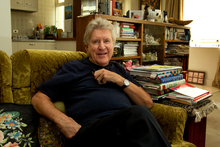The Passionless People was a runaway success for author Gordon McLauchlan when it dismantled New Zealand society and framed its citizens as inert, smug and content. "Smiling zombies" was McLauchlan's phrase for the people who inhabited its fair shores in 1976.
With the addition of a verb and nearly four more decades of close inspection, McLauchlan has returned with The Passionless People. The author may have changed - he is now 81 and carrying some of the burden of the years - but his convictions remain intact.
The cast of the new book has an appropriate 21st century flavour but under the bonnet the moving parts of the new edition adhere faithfully to the model which served him well 37 years ago: McLauchlan offers excoriating judgments, biting satire, and the same breezy prose which has laced all his works.
He dissects booze culture - "passionless piss-ups" - the growing gap between rich and poor, sex, and casts a jaundiced eye across the state of literature. His verdict: "Our writers now mostly cruise through the minor angst of the middle-classes while large injustices thrive around them."
Here is McLauchlan on Prime Minister John Key: "I am fascinated by his incredible slightness of being. We know nothing much about him at all."
On welfare reform: "It will soon become blazingly obvious to the underclass that their best [course] of action is ... to get honours degrees from the London School of Economics and take jobs in Treasury. Then they wouldn't need to know anything painful about the world at large, would understand that people are economic units not human beings in a broader sense and could get jobs on government advisory committees as long as they add and subtract - especially subtract."
And - a particular bugbear of the journalist in McLauchlan - the dreaded committee meeting: "Part of the motivation for the committee is a kind of cowardice, a fear of taking responsibility. If people take a decision alone they are responsible for the outcome, as they should be. Fearful that the result of that decision may be challenged they seek refuge in the imprimatur of a meeting. This spreads any blame."
Full story at New Zealand Herald


1 comment:
Mmm. Even from what I read here, there's a complete lack of understanding of economics. More emoting leading me into the jail of the bigger and bigger State. No thanks Gordon.
We certainly do need a new counter-culture, but this time one that is centred on individualism and freedom, and there's only one economic system that leads to that, and limited government. And it's not the current one.
Judith Collins just gave SFO legal access to a journalist's source, so wiping out one of the central planks of a free press, and from that, a free society.
Why don't NZ writers start getting passionate about that?
Sorry, grumpier and grumpier these days.
Post a Comment